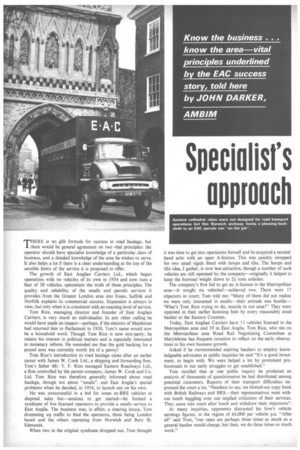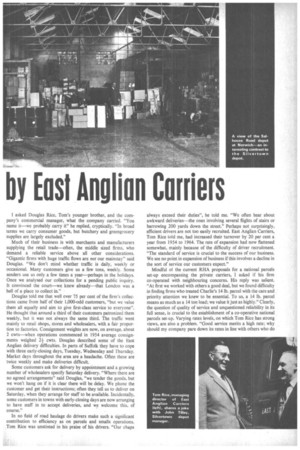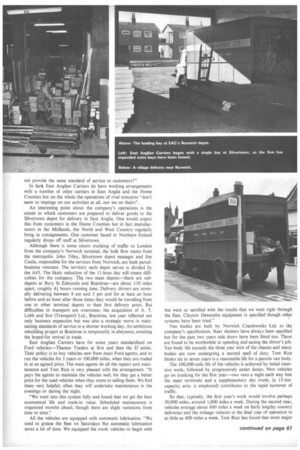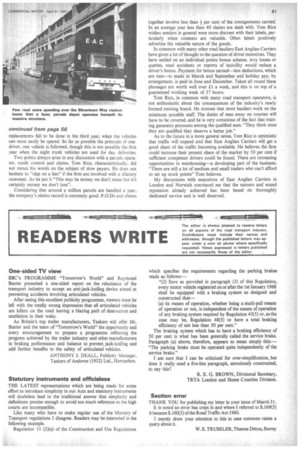Specialist's approach by East Anglin Carriers
Page 56

Page 57

Page 58

Page 63

If you've noticed an error in this article please click here to report it so we can fix it.
THERE is no glib formula for success in road haulage, but there would be general agreement on two vital principles: the operator should have specialist knowledge of a particular class of business, and a detailed knowledge of the area he wishes to serve. It also helps a lot if there is a clear understanding at the top of the sensible limits of the service it is proposed to offer.
The growth of East Anglian Carriers Ltd., which began operations with no vehicles of its own in 1954 and now runs a fleet of 30 vehicles, epitomizes the truth of these principles. The quality and reliability of the smalls and parcels services it provides from the Greater London area into Essex, Suffolk and Norfolk explains its commercial success. Expansion is always in view, but only when it is consistent with an exacting level of service.
Tom Rice, managing director and founder of East Anglian Carriers, is very much an individualist. In any other calling he would have made an impact—perhaps, if the electors of Maidstone had returned him to Parliament in 1950, Tom's name would now be a household word. Though Tom Rice is now non-party, he retains his interest in political matters and is especially interested in monetary reform. He reminded me that the gold backing for a pound note was currently worth krd of a penny!
Tom Rice's introduction to road haulage came after an earlier career with James W. Cook Ltd., a shipping and forwarding firm. Tom's father Mr. T. F. Rice managed Eastern Roadways Ltd., a firm controlled by the parent company, James W. Cook and Co. Ltd. Tom Rice was therefore generally informed about road haulage, though not about "smalls", and East Anglia's special problems when he decided, in 1954, to launch out on his own.
He was unsuccessful in a bid for some ex-BRS vehicles at disposal sales but—anxious to get started—he formed a syndicate of five licensed operators to provide a smalls service to East Anglia. The business was, in effect, a clearing house, Tom drumming up traffic to feed the operators, three being London based and the others operating from Norwich and Bury St. Edmunds.
When two in the original syndicate dropped out, Tom thought it was time to get into operations himself and he acquired a secondhand artic with an open A-licence. This was quickly swopped for two small rigids fitted with hoops and tilts. The hoops and tilts idea, I gather, is now less attractive, though a number of such vehicles are still operated by the company—originally it helped to keep the licensed weight down to 2' tons unladen.
The company's first bid to get an A-licence in the Metropolitan area—it sought six vehiclesi—achieved two. There were 17 objectors in court; Tom told me: "Many of them did not realize we were only interested in smalls—their attitude was hostile— 'What's Tom Rice trying to do, muscle in our area?" They were opposed in their earlier licensing bids by every reasonably sized haulier in the Eastern Counties.
Today, East Anglian Carriers have 11 vehicles licensed in the Metropolitan area and 19 in East Anglia. Tom Rice, who sits on the Metropolitan area Road Rail Negotiating Committee at Marylebone has frequent occasion to reflect on the early obstructions to his own business growth.
Asked if he recommended aspiring hauliers to employ knowledgeable advocates at public inquiries he said "It's a good investment, to begin with. We were helped a lot by prominent professionals in our early struggles to get established."
Tom recalled that at one public inquiry he produced an analysis of thousands of questionnaires he had distributed among potential customers. Reports of their transport difficulties impressed the court a lot. "Needless to say, we blotted our copy book with British Railways and BRS—their representatives went without lunch haggling over our implied criticisms of their services. They came into court after lunch and withdrew their objections".
At many inquiries, opponents distrusted his firm's vehicle earnings figures, in the region of £4,000 per vehicle p.a. "After all" said Tom, "our rates are perhaps three times as much as a general haulier would charge, but then, we do three times as much work."
asked Douglas Rice, Tom's younger brother, and the company's commercial manager, what the r company carried. "You name it—we probably carry it" he replied, cryptically. "In broad terms we carry consumer goods, but butchery and greengrocery supplies are largely excluded."
Much of their business is with merchants and manufacturers supplying the retail trade—often, the middle sized firms, who demand a reliable service aboVe all other considerations. "Gigantic firms with huge traffic flows are not our mainstay" said Douglas. "We don't mind whether traffic is daily, weekly or occasional. Many customers give us a few tons, weekly. Some senders use us only a few times a year—perhaps in the holidays. Once we analysed our collections for a pending public inquiry. It convinced the court—we knew already—that London was a hell of a place to collect in."
Douglas told me that well over "75 per cent of the firm's collections came from half of their 1,000-odd customers, "but we value them all equally and aim to give first-class service to everyone". He thought that around a third of their customers patronized them weekly, but it was not always the same third. The traffic went mainly to retail shops, stores and wholesalers, with a fair proportion to factories. Consignment weights are now, on average, about 2 cwts—when operations commenced in 1954 average consignments weighed 24 cwts. Douglas described some of the East Anglian delivery difficulties. In parts of Suffolk they have to cope with three early-closing days, Tuesday, Wednesday and Thursday. Market days throughout the area are a headache. Often these are twice weekly and make deliveries difficult.
Some customers ask for delivery by appointment and a growing number of wholesalers specify Saturday delivery. "Where there are no agreed arrangements" said Douglas, "we tender the goods, but we won't hang on if it is clear there will be delay. We phone the customer and get their instructions; often they tell us to deliver on Saturday, when they arrange for staff to be available. Incidentally, some customers in towns with early-closing days are now arranging to have staff in to accept deliveries, and we welcome this, of course."
In no field of road haulage do drivers make such a significant contribution to efficiency as on parcels and smalls operations. Tom Rice was unstinted in his praise of his drivers. "Our chaps always exceed their duties", he told me. "We often hear about awkward deliveries—the ones involving several flights of stairs or barrowing 200 yards down the street." Perhaps not surprisingly, efficient drivers are not too easily recruited. East Anglian Carriers, Tom Rice told me, had increased their turnover by 20 per cent a year from 1954 to 1964. The rate of expansion had now flattened somewhat, mainly because of the difficulty of driver recruitment. "The standard of service is crucial to the success of our business. We see no point in expansion of business if this involves a decline in the sort of service our customers expect."
Mindful of the current RHA proposals for a national parcels set-up encompassing the private carriers, I asked if his firm co-operated with neighbouring concerns. His reply was salient. "At first we worked with others a good deal, but we found difficulty in finding firms who treated Charlie's 14 lb. parcel with the care and priority attention we knew to be essential. To us, a 14 lb. parcel means as much as a 14 ton load; we value it just as highly." Clearly, the question of quality of service and unquestioned reliability in its full sense, is crucial to the establishment of a co-operative national parcels set-up. Varying rates levels, on which Tom Rice, has strong views, are also a problem. "Good service merits a high rate; why should my company pare down its rates in line with others who do not provide the same standard of service to customers?"
In face, East Anglian Carriers do have working arrangements with a number of other carriers in East Anglia and the Home Counties but on the whole the operations of rival concerns "don't seem to impinge on our activities at all, norwe on theirs".
An interesting point about the company's operations is the extent to which customers are prepared to deliver goods to the Silvertown depot for delivery in East Anglia. One would expect this from customers in the Home Counties but in fact manufacturers in the Midlands, the North and West Country regularly bring in consignments. One customer based in Northern Ireland regularly drops off stuff at Silvertown.
Although there is some return trunking of traffic to London from the company's Norwich terminal, the bulk flow stems from the metropolis. John Tilley, Silvertown depot manager and Jim Castle, responsible for the services from Norwich, are both parcelbusiness veterans. The territory each depot serves is divided by the A45. The likely reduction of the 11-hour day will create difficulties for the company. The two main depots—there are subdepots at Bury St Edmunds and Braintree—are about 110 miles apart, roughly 4i hours running time. Delivery drivers are normally delivering between 8 am and 5 pm and for at least an hour before and an hour after those times they would be travelling from one or other terminal depots to their first delivery point. But difficulties in transport are overcome; the acquisition of A. T. Lobb and Son (Transport) Ltd., Braintree, last year reflected not only business expansion but was also a strategic move in maintaining standards of service in a shorter working day. An ambitious rebuilding project at Braintree is temporarily in abeyance, awaiting the hoped-for revival in trade.
East Anglian Carriers have for some years standardized on Ford vehicles—Thames Traders at first and then the D series. Their policy is to buy vehicles new from main ford agents, and to run the vehicles for 3 years or 100,000 miles, when they are traded in at an agreed price. The main agents do all the repairs and maintenance and Tom Rice is very pleased with the arrangement. "It pays the agents to maintain the vehicles well, for they get a better price for the used vehicles when they come to selling them. We find them very helpful; often they will undertake maintenance in the evenings or during the night.
"We went into this system fully and found that we get the best economical life and trade-in 'value. Scheduled maintenance is organized months ahead, though there are slight variations from time to time."
All the vehicles are equipped with automatic lubrication. "We used to grease the fleet on Saturdays Ilut automatic lubrication saves a lot of time. We equipped the trunk vehicles to begin with but were so satisfied with the results that we went right through the fleet. Clayton Dewandre equipment is specified though other systems have been tried."
Van bodies are built by Norwich Coachworks Ltd. to the company's specification. Rear shutters have always been specified but for the past two years side doors have been fitted too. These are found to be worthwhile in speeding and easing the driver's job. Van body life exceeds the three year stint of the chassis and many bodies are now undergoing a second spell of duty. Tom Rice thinks six to seven years is a reasonable life for a parcels van body.
The 100,000-mile life of the vehicles is achieved by initial intensive work, followed by progressively easier duties. New vehicles go on trunking for the first year—two vans a night each way link the main terminals and a supplementary day trunk, (a 15-toncapacity artic is employed) contributes to the rapid turnover of traffic.
So that, typically, the first year's work would involve perhaps 50,000 miles, around 1,000 miles a week. During the second year, vehicles average about 600 miles a week on fairly lengthy country deliveries and the mileage reduces in the final year of operation to as little as 400 miles a week. Tom Rice has found that most major replacements fall to be done in the third year, when the vehicles can most easily be spared. So far as possible the principle of onedriver, one vehicle is followed, though this is not possible the first year when the night trunk vehicles are used for day deliveries.
Two points always arise in any discussion with a parcels operator, credit control and claims. Tom Rice, characteristically, did not mince his words on the subject of slow payers. He does not hesitate to "slap on a lien" if the firm are involved with a dilatory customer. As he put it "This may be money we don't make but it's certainly money we don't lose".
Considering that around a million parcels are handled a year, the company's claims record is extremely good. P.O.Ds and claims together involve less than per cent of the consignments carried. In an average year less than 40 claims are dealt with. Tom Rice wishes senders in general were more discreet with their labels, particularly when contents are valuable. Often labels positively advertise the valuable nature of the goods.
In common with many other road hauliers East Anglian Carriers have given a lot of thought to the question of driver incentives. They have settled on an individual points bonus scheme. Any losses or queries, road accidents or reports of incivility would reduce a driver's bonus. Payment for bonus earned—less deductions, which are rare—is made in March and September and holiday pay, by arrangement, is paid in June and December. Taken all round these plussages are worth well over Ll a week, and this is on top of a guaranteed working week of 57 hours.
Tom Rice, in common with many road transport operators, is not enthusiastic about the consequences of the industry's newly formed training board. He stresses that most hauliers work on the minimum possible staff. The duties of men away on courses will have to be covered, and he is very conscious of the fact that training generates pressures among the qualified men. "They think once they are qualified they deserve a better job."
As to the future in a more general sense, Tom Rice is optimistic that traffic will expand and that East Anglian Carriers will get a good share of the traffic becoming available. He believes the firm could increase their present share of the market by 50 per cent if sufficient competent drivers could be found. There are increasing opportunities in warehousing—a developing part of the business. "There are still a lot of medium and small traders who can't afford to set up stock points" Tom believes.
My discussions with executives of East Anglian Carriers in London and Norwich convinced me that the success and sound reputation already achieved has been based on thoroughly dedicated service and is well deserved.




































































































































